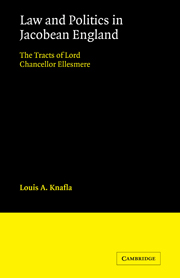Book contents
- Frontmatter
- Contents
- Preface
- List of abbreviations
- Notes on style
- Table of statutes
- Table of cases
- INTRODUCTION
- PART ONE LAW AND POLITICS
- I The Making of a Legal Mind
- II Kingship and the Problem of Sovereignty
- III Lords and Commons
- IV Reforming Privy Councillors: Crown Finances and the Administration of Government
- V The Problem of Law Reform
- VI The Clash of Jurisdictions: Central and Local Authorities, Secular and Ecclesiastical
- VII Les Enfants Terribles: Coke, Ellesmere, and the Supremacy of the Chancellor's Decree
- VIII The Provenance of Ellesmere's Tracts
- PART TWO ELLESMERE'S TRACTS
- Index of Persons and Places
- Index of Subjects and Terms
V - The Problem of Law Reform
Published online by Cambridge University Press: 05 January 2012
- Frontmatter
- Contents
- Preface
- List of abbreviations
- Notes on style
- Table of statutes
- Table of cases
- INTRODUCTION
- PART ONE LAW AND POLITICS
- I The Making of a Legal Mind
- II Kingship and the Problem of Sovereignty
- III Lords and Commons
- IV Reforming Privy Councillors: Crown Finances and the Administration of Government
- V The Problem of Law Reform
- VI The Clash of Jurisdictions: Central and Local Authorities, Secular and Ecclesiastical
- VII Les Enfants Terribles: Coke, Ellesmere, and the Supremacy of the Chancellor's Decree
- VIII The Provenance of Ellesmere's Tracts
- PART TWO ELLESMERE'S TRACTS
- Index of Persons and Places
- Index of Subjects and Terms
Summary
In the second decade of the seventeenth century Lord Ellesmere turned not only to the pressing economic and fiscal problems of the Crown and the viability of the government, but also to significant legal problems which had troubled him for some time. At the accession of James the Chancellor had noted irregularities in the usage of the forms of action at common law, and he put forward suggestions for a revision of the statute law. His proposals for the reform of statutes included the abolition or reworking of all enactments which were ‘obsolete’, ‘impossible’, ‘unnecessary’, ‘unprofitable’, ‘contrary’, ‘confused’, or ‘multiple’. In more detailed papers he grouped such acts into several categories: statutes to be ‘repealed’, ‘altered’, ‘enlarged’, or created ‘anew’. However, these proposals had little impact in the halls of Parliament, and they became dormant by 1610 with the collapse of an effective working relationship between the Crown and the House of Commons. Future progress in the reform of statute law would have to rest with the attempt of the reforming faction in the Privy Council to gain the confidence of the King and seize the initiative in the governing process.
In the meantime, the problems confronting the administration of the law were equally serious. The reform of the common law was a subject which traditionally had been the preserve of the law profession. Changes in common law process came largely from within, and the years of the late sixteenth and early seventeenth centuries were critical ones in its history.
- Type
- Chapter
- Information
- Law and Politics in Jacobean EnglandThe Tracts of Lord Chancellor Ellesmere, pp. 105 - 122Publisher: Cambridge University PressPrint publication year: 1977
- 2
- Cited by

